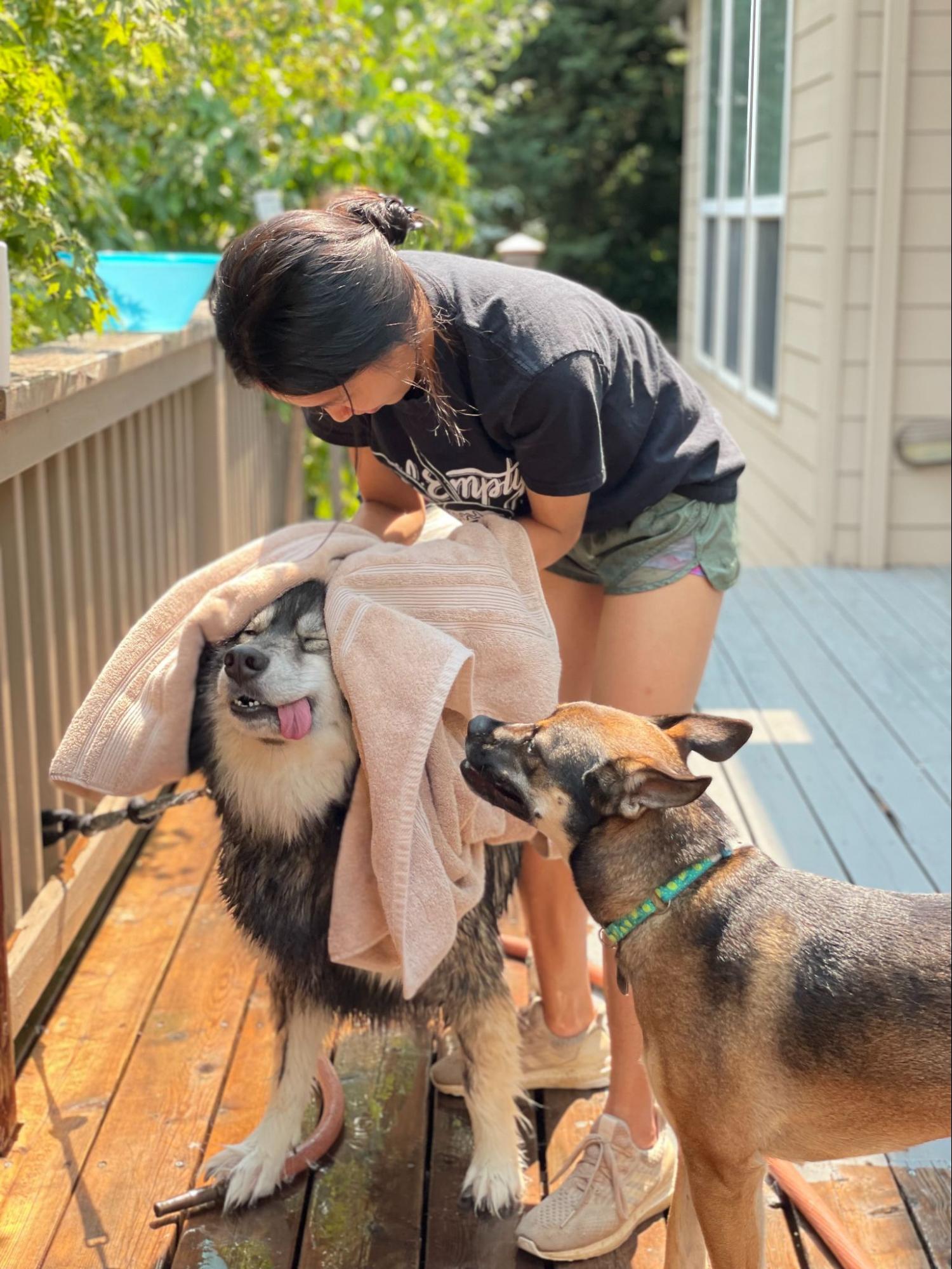Do Dogs Get Seasonal Allergies?
Many of us are tormented by seasonal allergies, each of us with stories of reactions ranging from mild bother to complete torment. While they may not show it in the same way, our dogs can also be the victims of seasonal allergies.
Pollen Allergies in Dogs
The pollen in spring and summer and sometimes into the fall can be the worst for dogs. Tree pollen begins in spring as leaves start budding on the branches. Grass pollen gets heavier as summer comes along. If your pup should experience any of the below symptoms, contact your vet if you are concerned:
- Itchy skin
- Red nose
- Hair loss
- Sleepiness
- Swollen, itchy paws
- Excessive rubbing or licking of affected areas
- Ear infections
Grass Allergies in Dogs
Grass allergy is caused by tiny particles that float through the air that we cannot see. The tiny particles can be absorbed into the dog’s skin and nasal passages creating an allergic reaction. Your dog’s fur can also pick up grass pollen, even if you decide to keep them inside during the spring and summer months. You will bring in grass pollen from your shoes and pollen.
When Are Seasonal Allergies Common in Dogs?
Typically seasonal allergies gear up in the spring, fall, and sometimes in the fall. Knowing what time of year is a struggle for your pup will help you stay on top of their symptoms. Some dogs will, unfortunately, suffer from allergies for more than one season.
Spring
Some common Spring allergies included tree pollen, weeds, grass, mold, mildew, and must. This time of year can be difficult for your dog so staying on top of their allergies is essential.
Fall
Though there isn’t new growth of trees, grass, and flowers during the fall season, there are some other contributing factors to why your dog may be suffering. Dying plants, chillier temperatures, wind, and moisture can all trigger allergy symptoms.

Symptoms of Seasonal Allergies in Dogs
Seasonal allergies are due to an imbalance in dogs’ immune response to allergens such as grass pollens, house dust mites, and more. Common reactions to seasonal allergies in pets include scratching and biting, paw-licking, and excessive shedding. More severe symptoms can involve ear infections, inflamed skin, and respiratory issues.
Scratching and Biting
Dogs will often bite and scratch their skin as a result of pollen in the environment. If the dog persistently itches one area, it can become a “hot spot,” a red, irritated, wet area that can become large and sore very quickly.
Licking Paws
While it is pretty standard for dogs to lick their paws as part of the grooming process, excessive licking or chewing of their paws is a concern that there could be other issues. The constant licking and biting can lead to a secondary infection due to the extra moisture.
Heavy Shedding
Almost all dog owners expect that their four-legged friend will shed their fur. Allergies can cause an increase in shedding, and you should pay attention to properly treat them.
Scratching at Ears
If a dog scratches his ears too much, it can cause painful ear infections that need treatment. Ear scratching is also a common reaction to pollen.
Inflamed Skin
Itchy, dry, or cracked skin could be a sign of environmental dermatitis. Things like grass, dirt, and plants can cause the skin to have allergic reactions.
Hives
Pollen, dust, fleas, and other allergens can give dogs hives. Hives appear as red, swollen, and itchy skin irritants in dogs.
Trouble Breathing
Coughing, hard time breathing, and asthma are all reactions to seasonal allergies in dogs. In some cases, the dog will have a cough and possibly sometimes wheezing.
Discharge from Eyes
Allergies in dogs can cause a discharge in the eyes that can range from a watery and clear consistency to a pus-like discharge that could be a sign of a bigger problem if it becomes crusty.
How Do I Help Alleviate My Dog’s Seasonal Allergies?
Taking action against your dog’s seasonal allergies could vastly improve their quality of life, especially if they’re experiencing some of the more extreme side effects. Luckily, even the most effective precautions an owner can take are both simple and in-line with good health habits in general.
Here are three tips on combating your dog’s seasonal allergies.
Balanced Diet
Most of us feed our dogs formulated kibble or wet dog food. It’s easy, we’re familiar with the format, and we know our dogs like it. What we may not be familiar with is just what’s inside our dogs’ food. The first step in a balanced diet for your dog is education. Read up on your dog’s brand of food, learn what ingredients to avoid, and discover what’s right for your dog.
Additionally, introducing things into your dog’s diet can be a big help. Fish and plant-based oils contain omega 3 and 6 essential fatty acids, which promote growth and repair,
skin health, and hair health.
Leafy greens can provide a health boost to your dog’s diet and play a role in combating seasonal allergies. If your dog is down, experiment with dandelion leaves, spinach, lettuce, and celery. These are known as cooling foods, which provide health benefits to the liver and skin.
Proper Grooming
The physical particles that cause seasonal allergies can end up in your dog’s fur and on their skin. Regular and appropriate amounts of grooming can benefit your dog by ensuring these particles don’t remain there for long, causing persistent issues or discomfort.
Generally, most dogs only need one bath per month unless they get into something unusually messy. When bath time does come around, consider using natural shampoos. Many shampoos on store shelves contain harsh soaps that wash protective oils from your dog’s skin and fur. These oils keep coats shiny and skin moisturized. After trips to the park, leave dirt and allergens on your dog, a simple rinse, and dry is more than enough in between regular baths.
Brushing is another key part of grooming. Brushing will keep your dog looking fresh, feeling good and promote healthy skin and fur. Try brushing your dog once a week. It provides bonding time between dog and parent and will reduce the amount of pet dander found in your home. Older dogs can especially benefit from a good brushing as they may not be able to groom themselves as effectively as they used to.

Immune Health
A direct and intentional focus on your dog’s immune health is another major way to combat seasonal allergies. Since seasonal allergies play out in the immune system, an internal health approach to the issue is an essential part of the mix.
Vitamin supplements can really round out your pet’s diet and provide a long line of benefits. Vivamune™ is a once-daily chew with immune-supporting properties and, no side effects unlike most allergy medication. OxC-beta, the proprietary active ingredient in Vivamune™, supports the immune system bringing it back into balance and helping dogs with seasonal allergies naturally.
There are very few supplements for dogs that support the immune system directly. Therefore, medications dampen the immune response so that there is no response – OxC-beta supports the immune system so that there is a normal response.
Talk to Your Vet About Your Dog’s Seasonal Allergies
If at any point you notice that your dog has changes to their skin, fur, or something that seems off, you should reach out to your vet to get an official diagnosis. Once your vet determines the allergies, they will develop a treatment plan.
How Are Seasonal Allergies Diagnosed in Dogs?
Your veterinarian will order a skin or blood test to identify what triggers your dog’s allergies. It is best practice not to diagnose your dog but leave that to your vet. If you feel your pup has seasonal allergies, your vet will be happy to help with that process.
What Steps Might the Vet Suggest to Alleviate Allergies?
Before you try any over-the-counter meds, make sure to consult your vet to ensure proper dosage. Some dogs react differently, and it’s good to remember that humans and animals will respond differently to meds such as Benadryl.
You can try some natural remedies if you are unsure about using the medicine without a prescription. You can try giving fatty acid supplements that can help soothe irritated skin. Giving your dog regular baths using hypoallergenic shampoos to remove pollen and grass can be helpful to reduce allergies. Pet owners have tried other remedies: tea tree oil, fish oil, other oils or an oatmeal bath.










